This is an archived article that was published on sltrib.com in 2017, and information in the article may be outdated. It is provided only for personal research purposes and may not be reprinted.
A three-judge panel on Monday upheld the dismissal of a Utah family's lawsuit against a Bureau of Land Management agent blamed for the suicide of Blanding physician James Redd, saying the agent was entitled to "qualified immunity" and his conduct did not violate Fourth Amendment prohibitions against excessive force.
Redd and his wife, Jeanne, were among those arrested in a controversial sting operation targeting Four Corners-area residents suspected of trafficking in artifacts looted from ancient American Indian graves and other archaeological sites. Special Agent Dan Love coordinated the undercover Operation Cerberus, which led to the suicides of two others involved.
The Redds alleged that under Love's direction, the BLM and FBI used excessive force in deploying numerous agents, equipped with tactical gear, to the doctor's home on the morning of the 2009 raids.
Love subjected Redd to a prolonged and humiliating interrogation, triggering his suicide the next day, the suit alleged.
Unless the Redd family asks for reconsideration, Monday's ruling should put the contentious lawsuit against Love to rest, although the Redd family has an appeal pending in a separate lawsuit against the federal government. U.S. District Judge Ted Stewart dismissed that case last year.
While the Redd litigation winds down, Blanding residents' resentment toward the BLM has not begun to fade.
Redd was a pillar of the community, and the raid was seen by some as unnecessary and thuggish invasion into the homes of law-abiding citizens. Since then, tensions have only escalated in San Juan County after the conviction of a county commissioner for leading a protest ride into Recapture Canyon and the controversial designation of the Bears Ears National Monument.
But as for Love, his conduct remained within the confines of the U.S. Constitution, despite the presence of as many as 22 federal officers at Redd's home at the time of Redd's arrest, according to Monday's opinion written by Judge Gregory Phillips of the 10th Circuit Court of Appeals.
Many of the officers were called in to help catalog hundreds of artifacts found in the Redd home, and extra security was needed in the face of threats, Love and other federal witnesses testified. Agency policies required that officers wear armor and firearms in situations where confrontations could be expected.
"Agent Love's conduct — deploying 22 agents wearing soft body armor and carrying firearms in compliance with agency policy — was not objectively unreasonable under the circumstances," Phillips wrote in the opinion that upheld a lower court ruling by U.S. District Judge Robert Shelby.
The Redd family alleged far more than 22 officers came to the home, but the evidence never determined how many were there at one time or even how many Redd would have seen. He was being processed in and out of jail during much of the time his home was searched.
After the Blanding raids, the BLM promoted Love to special-agent-in-charge for Utah and Nevada. In that role, he repeatedly upset rural sheriffs, county commissioners and lawmakers for what they alleged was his refusal to cooperate with local law enforcement. Love has since been reassigned.
Twitter: @brianmaffly
Brian Maffly covers public lands for The Salt Lake Tribune. Maffly can be reached at bmaffly@sltrib.com or 801-257-8713.
Twitter: @brianmaffly



